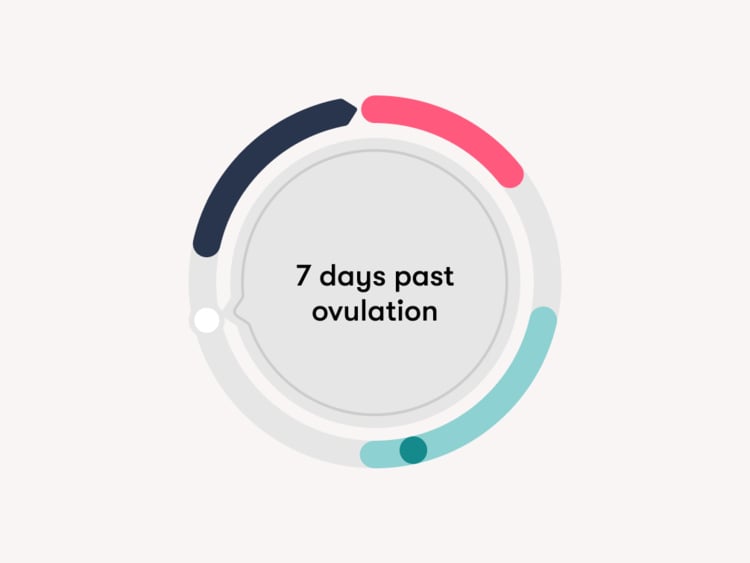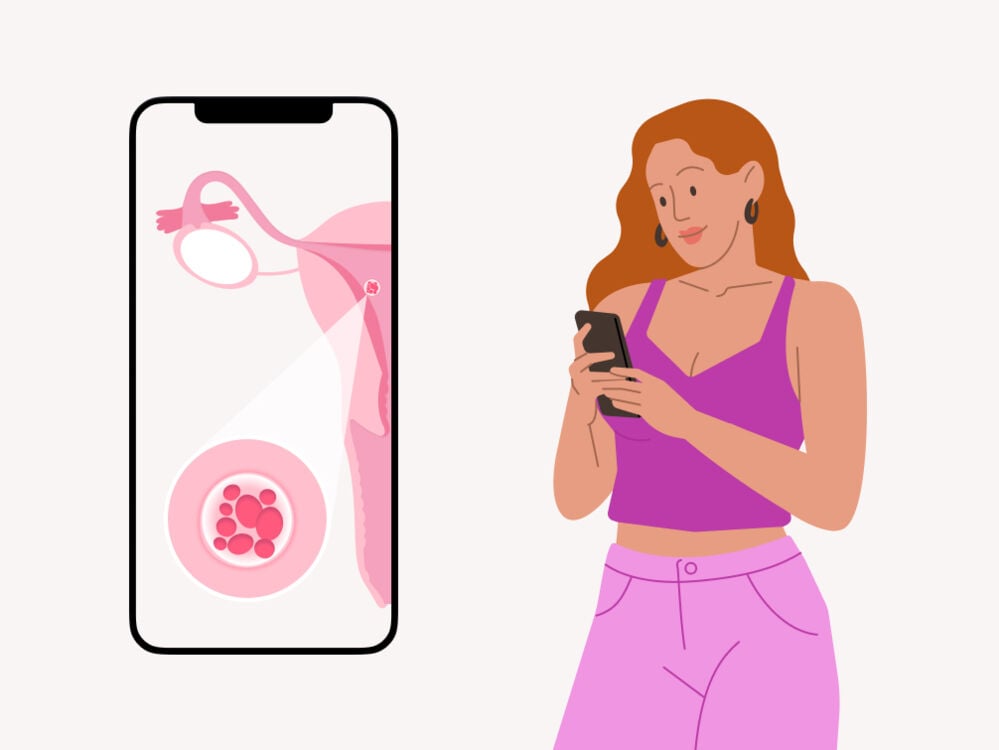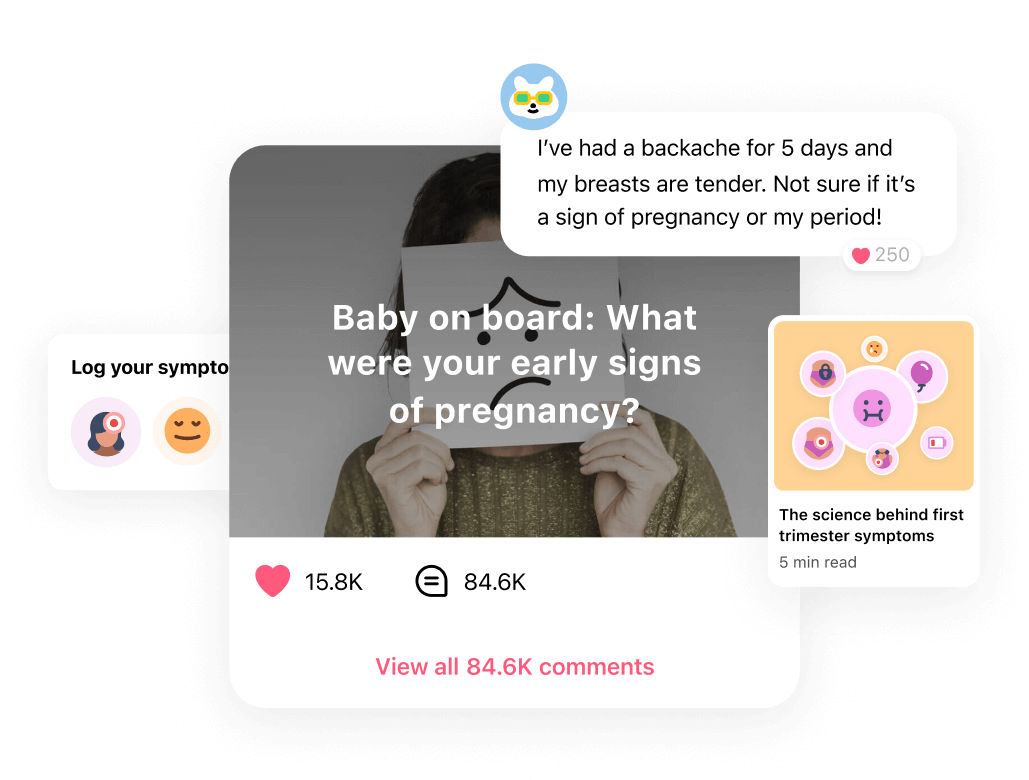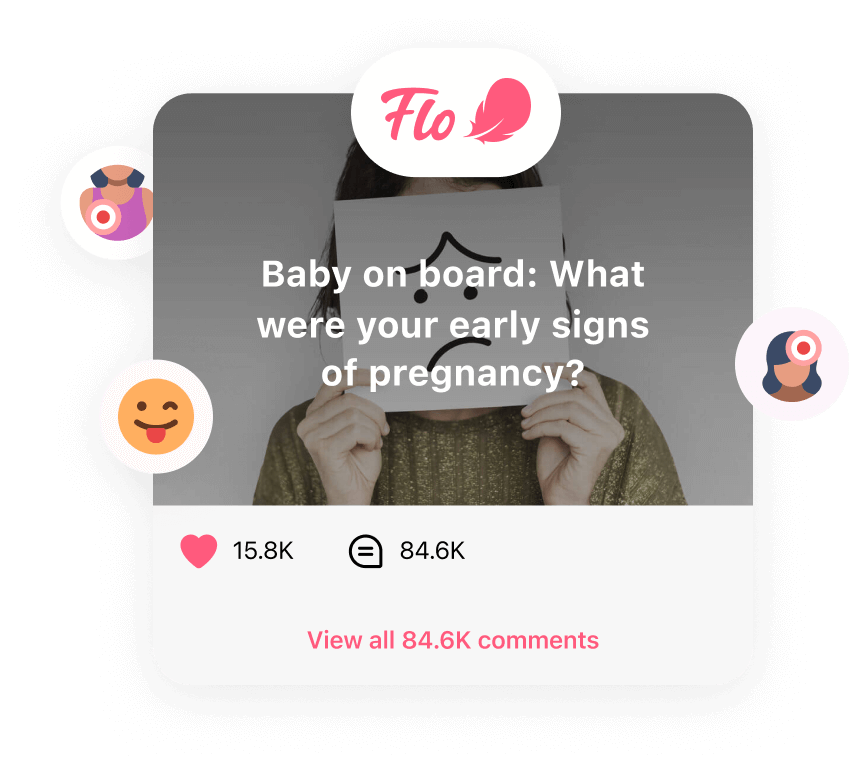Is it too early to notice early pregnancy symptoms? Can you take a pregnancy test? Here’s the lowdown on 7 DPO.
-
Tracking cycle
-
Getting pregnant
-
Pregnancy
-
Help Center
-
Flo for Partners
-
Anonymous Mode
-
Flo app reviews
-
Flo Premium New
-
Secret Chats New
-
Symptom Checker New
-
Your cycle
-
Health 360°
-
Getting pregnant
-
Pregnancy
-
Being a mom
-
LGBTQ+
-
Quizzes
-
Ovulation calculator
-
hCG calculator
-
Pregnancy test calculator
-
Menstrual cycle calculator
-
Period calculator
-
Implantation calculator
-
Pregnancy weeks to months calculator
-
Pregnancy due date calculator
-
IVF and FET due date calculator
-
Due date calculator by ultrasound
-
Medical Affairs
-
Science & Research
-
Pass It On Project New
-
Privacy Portal
-
Press Center
-
Flo Accuracy
-
Careers
-
Contact Us
7 DPO: Are there any pregnancy symptoms 7 days past ovulation?


Every piece of content at Flo Health adheres to the highest editorial standards for language, style, and medical accuracy. To learn what we do to deliver the best health and lifestyle insights to you, check out our content review principles.
At seven days past ovulation (or 7 DPO), you’re about one week away from your period — and if you’re trying to conceive, you might be ticking down the days until you can take a pregnancy test. This can be quite an emotional time, and it’s totally normal if you’re aware of every new feeling, ache, or potential symptom. But is 7 DPO too early to know if you’re pregnant?
Due to changes in your hormones that happen just before your period begins and just after you become pregnant, it can be hard to spot the differences between premenstrual symptoms and early pregnancy. So, here’s the lowdown on 7 DPO, including what’s going on in your body and when you can take a pregnancy test.
7 DPO symptoms if you’re pregnant
As 7 DPO is so close to when your period may begin, you may be on high alert for any new signs or symptoms that you might have conceived. It doesn’t help that early pregnancy symptoms are rather similar to some of the symptoms you might experience ahead of your period starting. Premenstrual syndrome, or PMS for short, is the term used to describe the different physical and emotional symptoms that you might feel at this time. So it’s hard to know what’s really happening.
Take a quiz
Find out what you can do with our Health Assistant
That said, understanding the early signs of pregnancy and knowing what happens during this stage of your menstrual cycle can help you feel more prepared and in tune with your body. Due to changes in your hormone levels both just before your period and in early pregnancy, some people do experience some symptoms, including:
- Cramps
- Mood swings
- Food cravings
- Breast pain or tenderness
- Fatigue or feeling more tired than usual
Let’s dig into these symptoms more.
Cramping
You may be no stranger to cramping in the week leading up to your period. It’s caused by hormone-like substances called prostaglandins. As your uterus releases them, they can cause it to contract, and you to feel cramps, so make sure you have a hot water bottle on hand to soothe any aches.
Alternatively, at 7 DPO, you might feel cramping when your fertilized egg attaches to your uterine lining (implantation). It’s important to note that there’s little scientific evidence to suggest that cramping is a sign of implantation. However, some people say they feel it. Just to make things even more confusing, the timing of premenstrual cramps and implantation cramping often line up, so it can feel very similar.
Mood swings
In the week leading up to your period, you might feel more irritable, upset, or stressed out. The highs can feel a lot higher and the lows a lot lower. This could be another symptom of PMS and may be due to hormonal fluctuations. However, as your hormone levels change in early pregnancy, you may also experience similar mood changes. Confusing, right?
Food cravings
We all have our own remedies for the symptoms that show up ahead of our period, and treating yourself to your favorite foods may help you. Food cravings have been linked to changes in your hormone levels during the luteal phase of your cycle (before your period). Your estrogen levels, in particular, can be linked to your appetite. Estrogen has been found to inhibit appetite. So, when levels of this hormone are low, you might feel hungrier.
While they could be a sign that your period is coming, food cravings are also a symptom of early pregnancy. But at 7 DPO, it’s probably too early to tell why you’re reaching for particular foods.
Breast pain
In the weeks before your period, your boobs may look and feel different. This is because your breasts can be sensitive to fluctuations in your hormones — sometimes known as cyclical breast pain. Similarly, after you’ve conceived, the blood flow to your chest increases, and your hormone levels change, meaning your breasts may feel swollen and tender.

Fatigue
As your hormone levels fluctuate in the week before your period begins, you might find yourself feeling much more exhausted than normal. But — you’ve guessed it — hormone changes are also a contributing factor as to why fatigue is considered to be a common pregnancy symptom. Listen to your body and catch a lunchtime nap if you can.
If you’re trying for a baby, then it’s totally normal to be on the lookout for telltale signs of pregnancy or want to compare notes with friends or relatives who have had a baby. However, every pregnancy is different, so try not to fixate on their experience.
It’s also true that waiting to take a pregnancy test can feel like a lifetime, so try to distract yourself by doing the things you love. Maybe that’s watching a new show or getting lost in a new novel, whatever takes your mind off things and helps you to relax a little.
7 DPO: What to expect?
At 7 DPO, one of your ovaries released an egg seven days ago. This means you’re in the luteal phase of your cycle. If you’re reading this and thinking, “What is the luteal phase?” here’s what you need to know.
Your menstrual cycle can be split into two stages:
- The follicular phase: Every new menstrual cycle starts on the first day of your period. That’s easy to remember, right? Your cycle can vary in length, and the first part of it is called your follicular phase. If your cycle is typically 28 days, then this usually lasts around 14 days. During this time, your estrogen levels rise, and the lining of your uterus thickens in preparation for a potential fertilized egg to implant.
- The luteal phase: Between days 14 and the end of your cycle, you enter the luteal phase. It starts after ovulation, which is when one of your ovaries releases an egg. Following this, your progesterone levels rise, and if your egg was fertilized by a sperm, then it may implant into the lining of your uterus, and you may become pregnant.
Seven DPO can be seen as a pretty important time in your cycle if you’re trying for a baby. According to Dr. Sara Twogood, obstetrician and gynecologist, Cedars-Sinai Medical Group, California, US, “Implantation occurs as early as six days after ovulation,” so it is technically possible for you to become pregnant at 7 DPO.
For this to happen, your egg needs to be fertilized by a sperm and then travel down your uterine tube and implant into your uterine lining. This signifies the start of pregnancy. Implantation can take place between six and 10 DPO.
After implantation, your body starts to produce the pregnancy hormone human chorionic gonadotropin (hCG). It helps to support your pregnancy and thickens the lining of your uterus to make implantation easier. While your hCG levels start low, they rise rapidly in the first few weeks of pregnancy. In some cases, they can almost double every three days, but this isn’t the same for everyone. At-home pregnancy tests work by detecting hCG in your pee.
7 DPO discharge: What’s normal?
As your hormones fluctuate throughout your cycle, your discharge also changes. Around ovulation, your discharge might look and feel clear and slippery, a little bit like raw egg whites. After you’ve ovulated (7 DPO), your discharge may be white, dry, or sticky. However, we’re all different, and discharge after ovulation can vary from person to person.
If you want to keep an eye on changes in your vaginal discharge and better understand your body’s baseline and patterns, it can help to log them in a period-tracking app like Flo.

 Over
7.8M
ratings averaging
4.8/5
*
Over
7.8M
ratings averaging
4.8/5
*
Understand your body’s signals with the Flo app
- Chat with others who are trying to get pregnant.
- Get trusted information on signs of pregnancy from 100+ medical experts.
- Log your symptoms and learn what they could be trying to tell you.
 Over
7.8M
ratings averaging
4.8/5
*
Over
7.8M
ratings averaging
4.8/5
*

Trying to conceive?
The Flo app can help you through the two-week wait.

 Over
7.8M
ratings averaging
4.8/5
*
Over
7.8M
ratings averaging
4.8/5
*
Understand your body’s signals with the Flo app
- Chat with others who are trying to get pregnant.
- Get trusted information on signs of pregnancy from 100+ medical experts.
- Log your symptoms and learn what they could be trying to tell you.
Can I take a pregnancy test at 7 DPO, or is it too early?
If your fertilized egg has implanted at 7 DPO, then your body will have started producing hCG. However, your levels will still be very low. It’s crucial to give your body enough time to produce high enough hCG levels to be detected by an at-home test. This is why it’s best to wait until after the first day of a missed period. At 7 DPO, it’s unlikely that a test will pick up your pregnancy.
If you do wait until after the first day of your missed period, most at-home pregnancy tests are 99% accurate, provided you use them at the right time and exactly as instructed. You can rest assured that you’ll get an accurate result. However, your period may not be due for another week, and waiting to take a test may feel like you’re in limbo.
If you feel it might help, go out and buy a test so you can take it on the morning of your missed period. Talk to loved ones about how you’re feeling or distract yourself by getting into a new series or starting a new book.
Are 7 DPO symptoms a sign of a BFP?
If you’ve been trying to conceive, then you may have already heard the acronym BFP or “big fat positive.” The fertility space really is full of acronyms.
Fear not if you’ve never heard of a BFP. It’s simply a positive pregnancy test result. As we’ve already said, it’s still a little early to do a pregnancy test at 7 DPO. For the most accurate results, it’s best to wait until the first day of a missed period.
7 DPO and no symptoms
Implantation may have happened at 7 DPO, which may mean you’re officially pregnant. This can be pretty exciting, but you may not feel any different because it’s still very early. In fact, you might not have any symptoms for a few weeks — and that’s completely normal. Remember: Every pregnancy is different.
Key takeaways
- At 7 DPO, it’s still generally too early to experience early pregnancy symptoms, as implantation (when the egg implants into the lining of your uterus) may have only just happened. This doesn’t necessarily mean that you won’t become pregnant this cycle.
- It’s recommended that you wait until after the first day of a missed period before you take a pregnancy test.
- Pregnancy tests work by detecting the pregnancy hormone hCG in your pee, which your body starts to produce following implantation. Your hCG levels rise during the first few weeks of pregnancy, making it easier to detect with a test.
More FAQs about being 7 DPO
How likely is pregnancy seven days after ovulation?
As implantation can happen between six and 10 DPO, you might be wondering how likely it was that it happened at 7 DPO and if you’re officially considered pregnant from this point. The reality is that pinpointing the exact moment implantation took place is pretty impossible.
Where do you feel implantation cramps?
Like so many symptoms associated with early pregnancy, some people say they experience implantation cramps, while others don’t feel anything at all. If you feel a dull ache in your lower abdomen that goes away by itself, then this could be a sign of implantation. However, as implantation often aligns with when you might start noticing premenstrual cramping, the only way to know if you’re pregnant is to wait and take a pregnancy test.
At how many DPO do hCG levels rise?
Once implantation has happened, your body will start releasing the pregnancy hormone hCG. It’s impossible to measure your hCG levels at home, but if you’re curious about how your hCG levels are multiplying, then you can speak to your doctor. That said, hCG blood tests are not usually offered as routine, and it’s perfectly normal not to know at what rate your hCG levels are rising. Your doctor may only offer this if they’re concerned about how your pregnancy is progressing.


Hey, I'm Anique
I started using Flo app to track my period and ovulation because we wanted to have a baby.


The Flo app helped me learn about my body and spot ovulation signs during our conception journey.


I vividly
remember the day
that we switched
Flo into
Pregnancy Mode — it was
such a special
moment.
Real stories, real results
Learn how the Flo app became an amazing cheerleader for us on our conception journey.
References
“Am I Pregnant?” Cleveland Clinic, my.clevelandclinic.org/health/articles/9709-pregnancy-am-i-pregnant. Accessed 26 Mar. 2025.
“Conception.” Cleveland Clinic, my.clevelandclinic.org/health/articles/11585-conception. Accessed 26 Mar. 2025.
“Doing a Pregnancy Test.” NHS, www.nhs.uk/pregnancy/trying-for-a-baby/doing-a-pregnancy-test/. Accessed 26 Mar. 2025.
“First Trimester Fatigue.” Johns Hopkins Medicine, www.hopkinsmedicine.org/health/conditions-and-diseases/first-trimester-fatigue. Accessed 26 Mar. 2025.
“Five Tips for Coping with PMS Cravings.” UPMC HealthBeat, 3 Nov. 2014, share.upmc.com/2014/11/five-tips-coping-pms-cravings/.
“Follicular Phase.” Cleveland Clinic, my.clevelandclinic.org/health/body/23953-follicular-phase. Accessed 26 Mar. 2025.
Gudipally, Pratyusha R., and Gyanendra K. Sharma. “Premenstrual Syndrome.” StatPearls, StatPearls Publishing, 17 July 2023, https://www.ncbi.nlm.nih.gov/books/NBK560698/.
Hirschberg, Angelica Lindén. “Sex Hormones, Appetite and Eating Behaviour in Women.” Maturitas, vol. 71, no. 3, Mar. 2012, pp. 248–56, doi:10.1016/j.maturitas.2011.12.016.
“Home Pregnancy Tests: Can You Trust the Results?” Mayo Clinic, 23 Dec. 2022, www.mayoclinic.org/healthy-lifestyle/getting-pregnant/in-depth/home-pregnancy-tests/art-20047940.
“Implantation Bleeding.” Cleveland Clinic, my.clevelandclinic.org/health/symptoms/24536-implantation-bleeding. Accessed 26 Mar. 2025.
Kim, Su-Mi, and Jong-Soo Kim. “A Review of Mechanisms of Implantation.” Development and Reproduction, vol. 21, no. 4, 31 Dec. 2017, p. 351–59, doi:10.12717/DR.2017.21.4.351.
“Luteal Phase.” Cleveland Clinic, my.clevelandclinic.org/health/articles/24417-luteal-phase. Accessed 26 Mar. 2025.
“Menstrual Cramps.” Mayo Clinic, 30 Apr. 2022, www.mayoclinic.org/diseases-conditions/menstrual-cramps/symptoms-causes/syc-20374938.
“Periods.” NHS, www.nhs.uk/conditions/periods/. Accessed 26 Mar. 2025.
“Ovulation.” Cleveland Clinic, my.clevelandclinic.org/health/articles/23439-ovulation. Accessed 26 Mar. 2025.
“Pregnancy Cravings and Food Aversions.” Tommy’s, www.tommys.org/pregnancy-information/being-pregnant/nutrition-pregnancy/cravings-food-and-drinks-pregnancy. Accessed 26 Mar. 2025.
“Premenstrual Syndrome (PMS).” Mayo Clinic, 25 Feb. 2022, www.mayoclinic.org/diseases-conditions/premenstrual-syndrome/symptoms-causes/syc-20376780.
“Progesterone.” Cleveland Clinic, my.clevelandclinic.org/health/body/24562-progesterone. Accessed 26 Mar. 2025.
“Signs and Symptoms of Pregnancy.” NHS, www.nhs.uk/pregnancy/trying-for-a-baby/signs-and-symptoms-of-pregnancy/. Accessed 26 Mar. 2025.
Stenman, Ulf-Håkan, et al. “Human Chorionic Gonadotropin in Cancer.” Clinical Biochemistry, vol. 37, no. 7, July 2004, pp. 549–61, https://doi.org/10.1016/j.clinbiochem.2004.05.008.
Su, Ren-Wei, and Asgerally T. Fazleabas. “Implantation and Establishment of Pregnancy in Human and Nonhuman Primates.” Advances in Anatomy, Embryology, and Cell Biology, vol. 216, 2015, pp. 189–213, doi:10.1007/978-3-319-15856-3_10.
Thiyagarajan, Dhanalakshmi K., et al. “Physiology, Menstrual Cycle.” StatPearls, StatPearls Publishing, 27 Sep. 2024, www.ncbi.nlm.nih.gov/books/NBK500020/.
“What Are Some Common Signs of Pregnancy?” Eunice Kennedy Shriver National Institute for Child Health and Human Development, www.nichd.nih.gov/health/topics/pregnancy/conditioninfo/signs. Accessed 25 Mar. 2025.
History of updates
Current version (14 April 2025)
Published (16 January 2023)
In this article

Get your personal guide to fertility
-
Learn how to read your body's ovulation signals
-
Find daily conception tips from our experts
-
Chat with others who are trying to get pregnant




